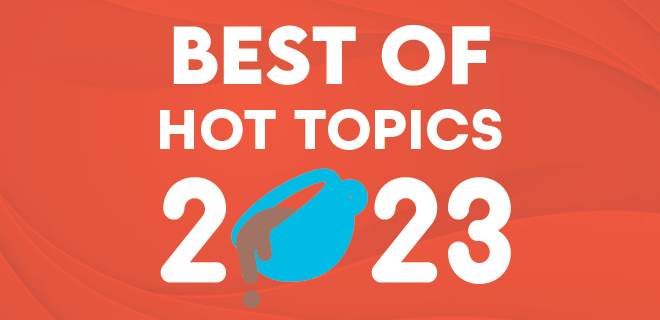
This year’s hot topics covered plenty of ground—the Privacy Sandbox, MediaMath Bankruptcy, big tech—but where does that leave us for 2024? We will discuss that and more in our LinkedIn Live with Chris Kane, Founder of Jounce Media.
This year, the ad tech industry tea was piping hot. From major DSPs going bankrupt to a slew of antitrust lawsuits against big tech companies, digital media professionals took a wild ride.
However, the year wasn’t all bad. Google is preparing for its third-party cookie deprecation, and for all intents and purposes, the industry feels ready for the new world order. It speaks to the resilience and innovation of our industry. Generative AI took the world by storm and gave the industry new tools. And what about the predicted recession? For the most part, ad spend is on a steady rise.
Here at AdMonsters, we cover all things ad tech, and we wanted to present you some of the hottest ad tech and digital media topics of 2023. But we don’t want to give too much away. On Wednesday, December 13, at 2 pm EST, we will chat with Chris Kane, Founder of Jounce Media, to hear his hot takes on the big news that dropped in 2023 and any 2024 predictions he has for digital media.
Here are AdMonsters’ Hot Topics of 2023:
Cookie Deprecation and the Privacy Sandbox
Chrome’s third-party cookie deprecation saga has gone on for years. After several postponements and an industry-wide panic, Google officially starts the cookie armageddon in January 2024. But that’s why Google released the Privacy Sandbox. They want to help publishers and advertisers to acclimate to the new Chrome cookieless ecosystem.
In the first phase, starting in Q4 of this year, ad tech companies can opt out of using third-party cookies for 10% of their Chrome traffic. This period will include labeling impressions as cookieless or not to facilitate A/B testing.
The second phase will occur in Q1 2024, where Google will deprecate third-party cookies for 1% of all global Chrome traffic. This marks the initial stage of deprecation and signals the commencement of intense testing.
Of course, the Privacy Sandbox is not the only solution. Most companies are tailoring several post-cookie solutions based on their needs.
MediaMath Bankruptcy
The trajectory of this 2023 hot topic was almost Biblical. We had the death of one of ad tech’s most beloved and well-regarded DSPs. After MediaMath announced its Chapter 11 bankruptcy, the industry gave its farewell eulogies and pondered who would take the weight of the massive $100 million debt.
There was some debate on whether sequential liability would fall on the backs of publishers. For publishers who were worried about repayment, sources suggested they rely on their relationship with their SSP partners.
Others thought this could revamp the entire payment process, “Based on the outcome of outstanding debt payments, there may be repercussions and changes to how payment terms are structured,” said Marc Boswell,Chief Revenue Officer at LoveToKnow Media. “This could be an interesting point of contention since most publishers aren’t directly controlling which DSPs are bidding on their inventory.”
MediaMath had a surprising resurrection after Infillion purchased the DSP. How will this play out in 2023?
Big Tech Regulation (Antitrust Season)
The federal government is not playing around with Big Tech. The three-headed monster — Google, Meta, Amazon — have faced a host of lawsuits accusing them of monopolizing the ad tech space.
Of course, this is not unique to 2023. The ad tech and digital media industry has complained about big tech’s monopoly for years, but the FTC has explicitly been raining down the hands of judgment on big tech.
For example, FTC Chair Lina Khan said, “Amazon is a monopolist, and it is exploiting its monopolies in ways that leave shoppers and sellers paying more for worse service. In a competitive world, a monopoly hiking prices and degrading service would open up rivals and potential rivals to … grow and compete. But Amazon’s unlawful monopolistic strategy has closed off that possibility, and the public is paying dearly.”
Is 2024 going to be the year the walled gardens start tumbling down?
Supply Chain Complexity
Programmatic has had benefits for publishers and advertisers, but all that glitters in the supply chain isn’t gold. At AdMonsters, we’ve heard digital media professionals describe the programmatic supply chain as complex or bloated, to name a few.
As Jana Maron told us, there are “too many players, with not much differentiated value, which have led to an extremely bloated supply chain.” She attributed the bloatedness to a lack of understanding that the internet and any website are ecosystems.
Even our LinkedIn Live guest, Chris Kane, noticed the complexity. In his “State of the Open Internet” report, he said, “Open Internet media companies and their ad tech counterparts are caught between the short-term financial obligation to contribute to bitstream bloat and the long-term financial goal of transitioning to two-sided marketplaces that unlock privileged data access.”
How can we fix it? Some believe it starts with eliminating some of the unnecessary intermediaries, but we can all agree there’s a lot of work ahead in 2024.
MFA Sites
The MFA scourge took over a lot of ad tech airtime in the last quarter of 2023. Firstly, as the industry worked to form a standard regulation, some black-owned publishers raised concerns about being labeled as MFA sites.
However, Kane asserted that while brand safety standards have often suppressed diverse-owned media, the MFA reformation does not marginalize diverse-owned publishers. In the grand scheme, the industry can remedy the confusion by creating an industry-wide definition of an MFA site.
Several industry regulators, such as Doubleverify, Jounce Media, and IAS, have supplied their own standards with some overlap. Despite that, these companies agree that the focus should be on performance metrics instead of arbitrage.
As Justin Barton said, “Marketing through paid means shouldn’t be restricted for publishers, despite certain research organizations associating paid traffic with negative outcomes in native ads.”
